Nassau is the capital of the Bahamas. As such, it’s home to the government, bustling marketplaces, and a significant portion of the nation’s population.
If you’re visiting the Bahamas, you certainly don’t want to miss vibrant Nassau. But is Nassau safe? The good news is that Nassau is a generally safe destination for tourists, though there are several neighborhoods you should avoid or exercise caution in.
Crime levels are similar to those in many major cities. US authorities have categorized Nassau in their travel advisory’s second level, advising tourists to “exercise increased caution.” This means that dangerous crime and violence do exist, but they’re not so prevalent that you should skip this beautiful city.
But in this guide, we don’t just focus on crime. We’ll go through all the potential hazards you might encounter in Nassau, including CO poisoning, natural disasters, shark encounters, COVID-19, and more.
Keep reading for info and what to expect and tips on how to stay safe.
Are you planning a last minute trip to Bahamas? We’ve put together all the resources you’ll need for a fun & safe travel:
🛌 Best & Safest Places to Stay in bahamas:
👉 The Reef at Atlantis – 2 swimming pools, Airport shuttle, 14 restaurants
👉 SLS at Baha Mar – Garden, Pets allowed, Sea view
👉 The Island House – Outdoor swimming pool, Family rooms, Fitness centre
👉 Comfort Suites Paradise Island – Outdoor swimming pool, Free WiFi, Bar
⛱️ Fun Activities & Tours in Bahamas:
👉 Nassau Food Tasting and Cultural Walking Tour
👉 Exuma Island Hopping & Swimming Pigs Tour with Lunch from Nassau
👉 ATV Rentals in Nassau Bahamas
🚗 Best & Safest Bahamas Transportation Services:
👉 Airport Pickup Service – Welcome Pickups
👉 Rent a Car – DiscoverCars
🙏 Stay Safe While Travelling:
👉 Safetywing (for medical insurance)
👉 VisitorsCoverage (for trip insurance)
Travel Advisory for Nassau
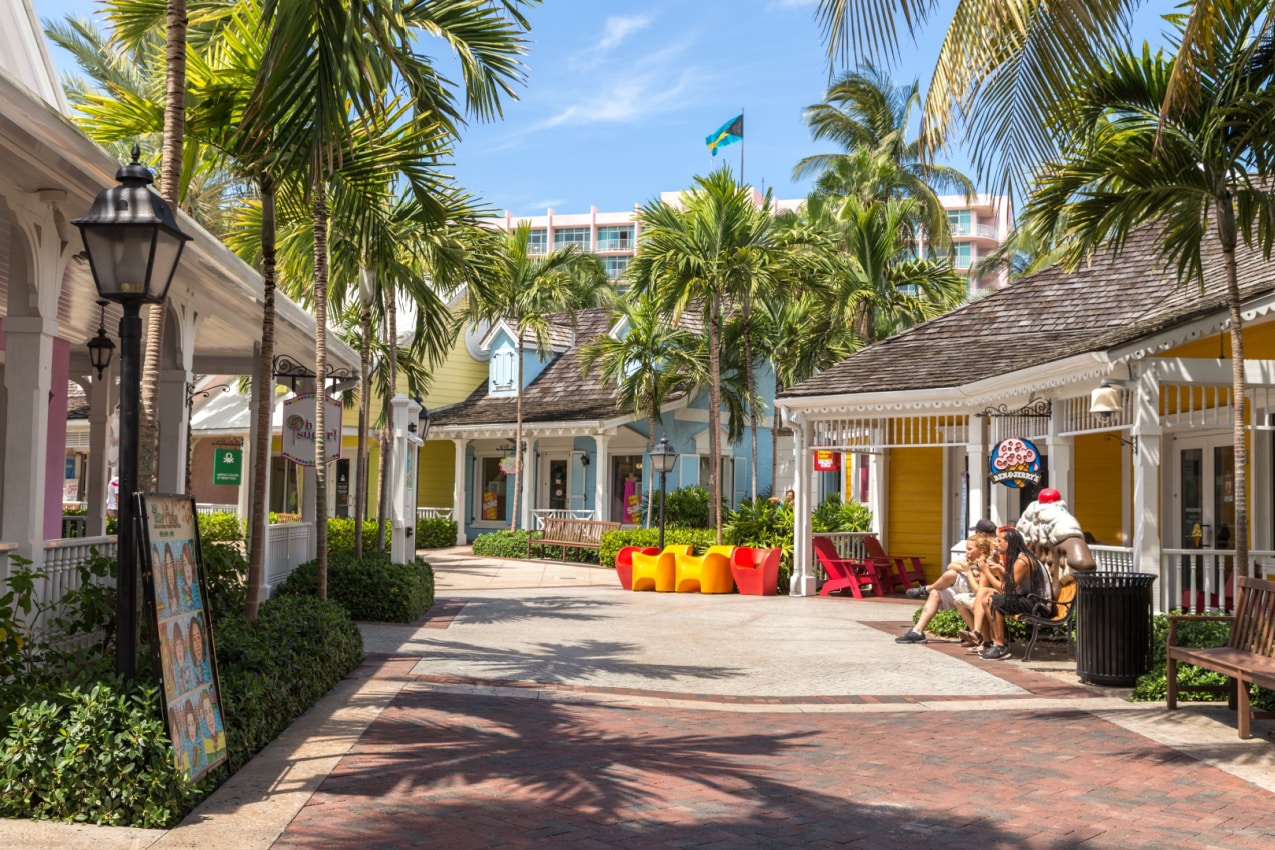
According to the U.S. State Department’s travel advisory, the safety of The Bahamas falls in the level 2 category – “Exercise Increased Caution” – and warns tourists of the following:
“In Nassau, you have to be extra vigilant in the area Over the Hill south of Shirley Street where inter-gang violence has resulted in a high rate of homicides primarily affecting the local population. Violent crimes occur in both tourist and non-tourist areas. Be vigilant when staying in short-term vacation rentals where private security companies are not present.”
The Canadian, British, and French governments offer their warnings too. They emphasize the importance of vigilance in Nassau, adding in their travel advisories the following:
“Thefts also occur at cruise ship terminals and in or around busy resorts, even during the day. Crimes increase during the holiday seasons. Credit card and ATM fraud occur, particularly in Nassau. Be vigilant at all times and don’t walk alone away from the main hotels, tourist areas, beaches, and downtown Nassau, particularly after dark.”
So, do the authorities encourage tourists to visit Nassau? Absolutely, but they emphasize the importance of not assuming it’s a crime-free paradise. Crime exists in any capital and around tourist hotspots, but it’s not alarming to the point where you should stay away from Nassau. The key is to take all the necessary precautions, which we’ll talk about towards the end of this guide.
Unveiling the Reality: A Comprehensive Look at Nassau Crime Rates
Safety statistics regarding Nassau indicate that its crime rate falls in the middle, with a score of 63.84. That means it’s not among the safest, but it’s also far from being the riskiest destination.
This year (2023), the capital has a lower crime index compared to major cities like Baltimore, US (74.92), Tijuana, Mexico (71.59), and Cape Town, South Africa (73.63). On the other hand, Nassau has higher crime rates than tourist hubs like Buenos Aires, Argentina (63.41), Playa Del Carmen, Mexico (47.25), Athens, Greece (56.06), and Paris, France (57.45).
Numbeo statistics reveal a rise in reported crimes over the past three years. To gain a more detailed understanding of the increase, we’ve made a chart consisting of all the crime reports for New Providence Island, home to Nassau.
These statistics cover the years 2020 to 2022 and are sourced from the official annual crime analysis provided by the Royal Bahamas Police records.
| Crimes Against Person | 2020 | 2021 | 2022 |
| Homicide | 59 | 104 | 113 |
| Attempted Homicide | 26 | 33 | 42 |
| Manslaughter | 0 | 3 | 3 |
| Rape | 37 | 40 | 37 |
| Attempted Rape | 5 | 4 | 7 |
| Unlawful Sexual Intercourse | 117 | 92 | 99 |
| Armed Robbery | 300 | 407 | 536 |
| Robbery | 88 | 86 | 118 |
| Attempted Robbery | 10 | 13 | 10 |
| Crimes Against Property | 2020 | 2021 | 2022 |
| Burglary | 115 | 63 | 75 |
| Housebreaking | 382 | 338 | 345 |
| Shop breaking | 391 | 388 | 395 |
| Stealing | 670 | 804 | 812 |
| Stealing from Vehicle | 801 | 625 | 371 |
| Car Theft | 211 | 266 | 309 |
Police Presence in Nassau
Tourists in Nassau can rest assured that a dedicated police force will come to their aid in times of danger, threats, or emergencies. The Royal Bahamas Police Force is the main authority for maintaining order in Nassau, with a sizable team of over 4,000 officers, reserves, and police civilians. They are also supported by INTERPOL, which enhances their ability to monitor and address organized crime.
In case of emergency, dial 911. However, remember that local laws apply to everyone, even visitors, so you, too, need to stay on the right side of the law.
Police officers regularly patrol the city – and especially the party venues at night – so it would be in your best interest to avoid any illegal activities. Do not buy narcotics, carry weapons, or drive under the influence of alcohol. Safety and respect for local laws go hand in hand for an enjoyable experience in Nassau.
Ensuring COVID-19 Safety in Nassau
As of 2023, there have been a total of 38,084 confirmed cases of coronavirus and 36,366 individuals have successfully recovered.
As of October 18, there are no reported cases of COVID among Nassau’s population of 227,936.
These relatively stable numbers have prompted the Government of The Bahamas to end all COVID-related measures, such as pre-arrival COVID-19 testing, proof of vaccine, The Bahamas Travel Health Visa, curfews, and wearing masks in public areas.
While authorities have lifted all restrictions regarding the virus, it’s essential to acknowledge that any pandemic can pose unforeseen challenges to the world. So continue to practice social distancing and regularly wash your hands.
In case you experience flu-like symptoms during your Nassau vacation, you can get tested at any hospital, clinic, or laboratory. If you develop symptoms before your trip, it’s highly advisable to postpone traveling to prevent potential virus spread and avoid exacerbating your symptoms with air travel.
Perils of Nature: The Risk of Natural Disasters in Nassau
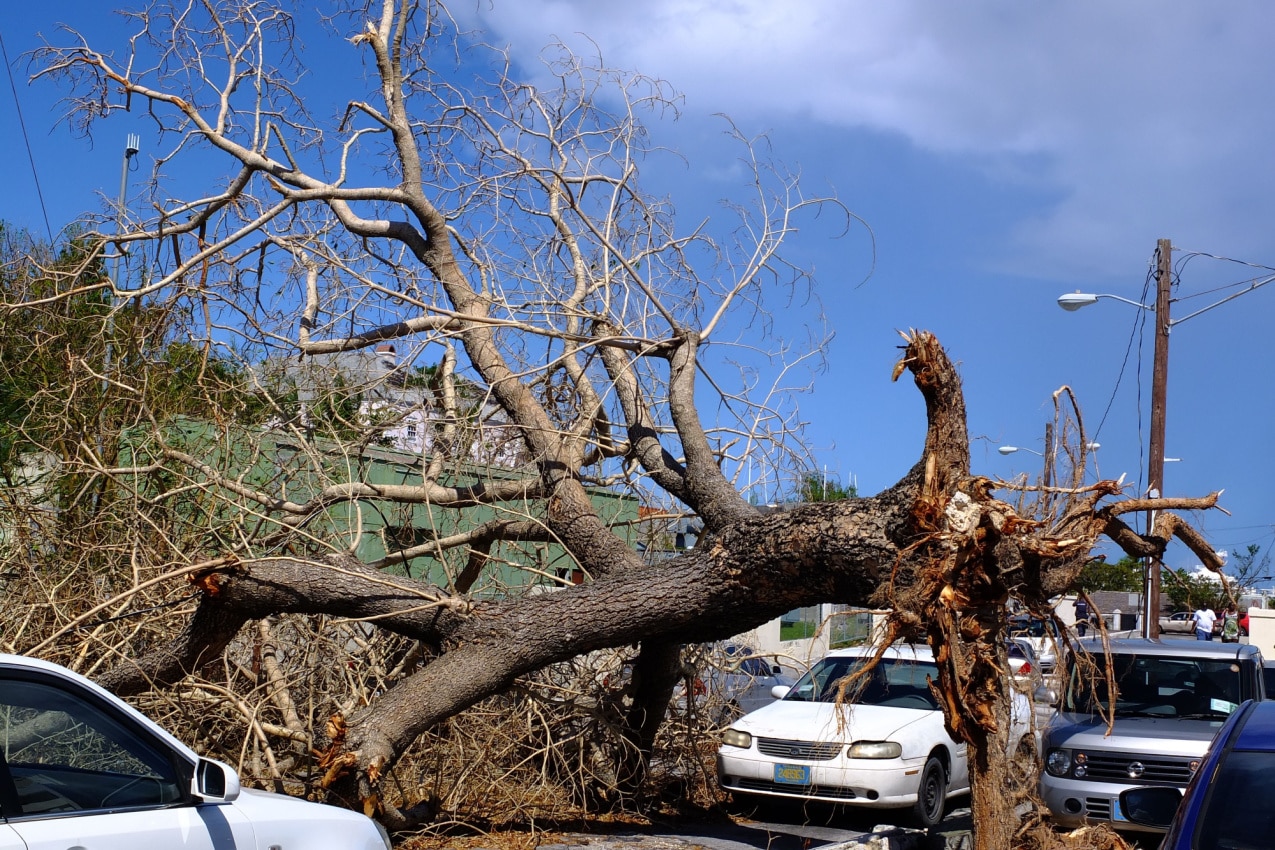
Nassau, like many coastal and island destinations, faces potential risks from various natural disasters.
Primarily, its location in the Atlantic Ocean’s warm waters means that there’s a danger of hurricanes. Additionally, being situated on the edge of the North American tectonic plate means that Nassau is at risk for low-level earthquakes.
Let’s delve into more details about these natural phenomena.
Hurricane Information and Precautions
Hurricanes are potent and destructive storms known for ferocious winds and heavy rainfall. They frequently lead to flooding, storm surges, and substantial infrastructural damage.
The official hurricane season in the Bahamas spans from June 1 to November 30, though hurricanes can also occasionally occur outside this timeframe. Hurricanes are most likely in August, September, and early October.
On average, The Bahamas experiences seven hurricanes a year. However, historical data reveals that Nassau hasn’t encountered any major hurricanes yet. So far, in this area, hurricanes tend to manifest as tropical storms with strong winds.
All in all, hurricanes in Nassau often do not pose an immediate or life-threatening risk. However, natural disasters are unpredictable, and given that Nassau is a coastal, island city, it’s vulnerable to destruction and flooding in the event of a major hurricane.
While such a devastating scenario has yet to occur (or hopefully – never), it’s best to stay up-to-date on the latest hurricane information in the area. Overall, it’s best to plan your travels outside of peak hurricane season.
Earthquake Information and Prevention
Earthquakes lead to structural damage and can trigger tsunamis or landslides.
In 2023, The Bahamas experienced only four earthquakes, indicating that the region is relatively stable. Plus, Nassau was not the epicenter of any of these earthquakes, so the region technically had zero earthquakes during the year 2023.
All in all, there’s no need to be concerned about earthquakes during your trip to Nassau. While The Bahamas do experience occasional, minor earthquakes, they are usually of low magnitude and their epicenter is outside of Nassau.
Carbon Monoxide Awareness and Prevention
Carbon monoxide (CO) is a silent and deadly gas. Unfortunately in 2022, it took the lives of three tourists during their stay at a resort in the Bahamas. So what makes carbon monoxide so hazardous?
This gas is produced when carbon-based fuels do not burn completely. CO can escape from malfunctioning appliances like stoves, gas water heaters, and furnaces. Since it’s invisible and odorless, our senses cannot alert us to its presence, which is how it’s believed the tourists were poisoned. The only way to recognize CO poisoning is through its symptoms.
When you inhale carbon monoxide, it disrupts the blood’s ability to deliver oxygen to your cells and tissues, causing headaches, nausea, and dizziness. It can cause paralysis or even brain damage in severe cases. Prolonged CO exposure can completely impair the blood’s ability to transport oxygen, ultimately leading to fatal consequences. In the tragic case of the tourists, they were exposed to lethal levels of CO while sleeping and never woke up.
Keep in mind that this was an isolated incident and not something you should really worry about.
Besides, The Royal Bahamas Police has urged citizens and rental companies to install carbon monoxide detectors outside every sleeping area in homes, rental units, and hotels. However, when traveling to Nassau, you can’t always be sure if a functional CO detector is in place in your room. To enhance your safety, you can carry a portable CO detector with you. These devices are cost-effective, typically priced around $20, and can be a lifesaver.
So, is CO poisoning dangerous? Yes. But it’s also unlikely and preventable. As long as you bring a portable carbon monoxide detector with you, absolutely. Your safety and peace of mind are well worth this small investment.
The Safety of Nassau Beaches
Nassau’s beaches are very safe thanks to a colored-flags system that denotes the safety levels and potential concerns, ensuring that visitors can enjoy the water securely. Here’s what each flag represents:
- Green flag: Calm waters, safe for swimming
- Yellow flag: Moderate currents, swim with caution
- Single red flag: Strong currents, swimming isn’t recommended
- Double red flags: Very dangerous, the water is closed to the public
- Red and yellow flag: Swimming area with lifeguards
- Black and white quartered flag: Surfing area, swimming isn’t allowed
- Purple flag: Dangerous marine life
The Bahamas has recorded a total of 32 shark attacks since 1749, which is relatively low. The most recent incident occurred in Nassau in 2022 when a 58-year-old American woman tragically lost her life while snorkeling.
When it comes to shark attacks, taking basic precautions is key. Avoid swimming at night, when sharks are more active, and refrain from swimming with open cuts to minimize the risk of shark encounters.
All in all, to prioritize safety, only swim on beaches with green flags.
Nassau Weather Patterns: What to Expect
Nassau’s climate is the epitome of tropical charm: hot and rainy from May to October and balmy and dry from November to April.
Average temperatures typically range from 80 to 90°F (26 to 32°C) in the summer and 70 to 89°F (21 to 31°C) in the winter. The wet season spans from May to October, with the rainiest months being July, August, and September. Nevertheless, the showers are usually in the afternoon and pass quickly.
Let’s go over each season so you know what to expect in this tropical paradise.
Nassau Weather Overview
It’s never really cold in The Bahamas. Still, there are shifts in weather.
Spring
March ushers in a delightful springtime in Nassau. You’ll enjoy daytime highs of about 79°F (26°C) and comfortably cooler evenings at 64°F (18°C). The ocean warms up as well, reaching around 77°F (25°C) – the perfect temperature for swimming.
April is known as one of the best times for a Nassau visit — it’s sunny but not scorching hot and it’s safely outside the hurricane season. Daytime highs reach 81°F (27°C), with nights at a mild 66°F (19°C).
As May arrives, temperatures and humidity begin to climb. Yet, the chance of rain remains modest. Any rain is typically a brief afternoon shower, leaving you with ample sunshine for the day’s adventures. In May, expect daytime temperatures around 84°F (29°C) and pleasant nights of approximately 72°F (22°C). The sea temperature is ideal for water activities, around 81°F (27°C).
Summer
June is the gateway to summer, with almost 14 hours of daylight and temperatures reaching 88°F (31°C). However, as Nassau’s summer unfolds, so does the hurricane season. There may be plenty of rainy days (up to 17), but the good news is that the odds of a hurricane hitting are still quite low.
July and August are the hottest months of the year, with daytime temperatures soaring to 90°F (32°C). So beach enthusiasts, take note: sunscreen is your best friend. You should also expect more afternoon showers, totaling about 19 rainy days per month, and a higher likelihood of a hurricane, so it’s wise to stay updated through local news for your safety.
Fall
The temperature remains warm throughout September and October, ranging about 88°F (31°C). But here’s the catch: it’s hurricane season. Tourism is declining, and several hotels are taking a break for maintenance. As a result, this is not the best time to visit The Bahamas.
November brings with it a change of scene. It marks the end of both wet and hurricane seasons in Nassau. With fewer rainy days and delightful temperatures (a pleasant 82°F/28°C), November shines as an excellent month for your Nassau adventure.
Winter
The start of winter greets you with abundant sunshine and clear blue skies. Daytime highs hover around 79°F (26°C), while nights settle around 64°F (18°C). It’s a perfect balance – you’ll neither sweat in the heat nor shiver in the cold.
Both January and February bring similar temperatures, with pleasant daytime highs of 77°F (25°C) and cooler nights at 63°F (17°C). Water temperatures dip to about 77°F (25°C), still perfect for swimming and sunbathing at the beach.
When Is the Best Time to Visit Nassau?
Although Nassau’s nice year-round, hurricane season is from June to November, while May is rather rainy.
The ideal time to visit Nassau is from December to April. You get picture-perfect weather and crystal-clear waters. However, this is also peak season for tourists, so expect fully booked hotels, higher prices, and occasional queues at popular spots.
For those looking to avoid the crowds and get up to 50% lower prices on hotels and air tickets, May and November are excellent options. During these months, you can still enjoy great weather (maybe a bit of rain here and there but definitely not hurricanes), but with the benefit of fewer visitors and lower prices.
The least favorable times to visit Nassau are during the peak hurricane months, September and October, as well as June, which is the rainiest month. During these months, activities are limited and some hotels close down temporarily for maintenance. For the best experience in Nassau, it’s wise to avoid these periods.
Exploring Nassau Solo or With Your Family: Things to Consider
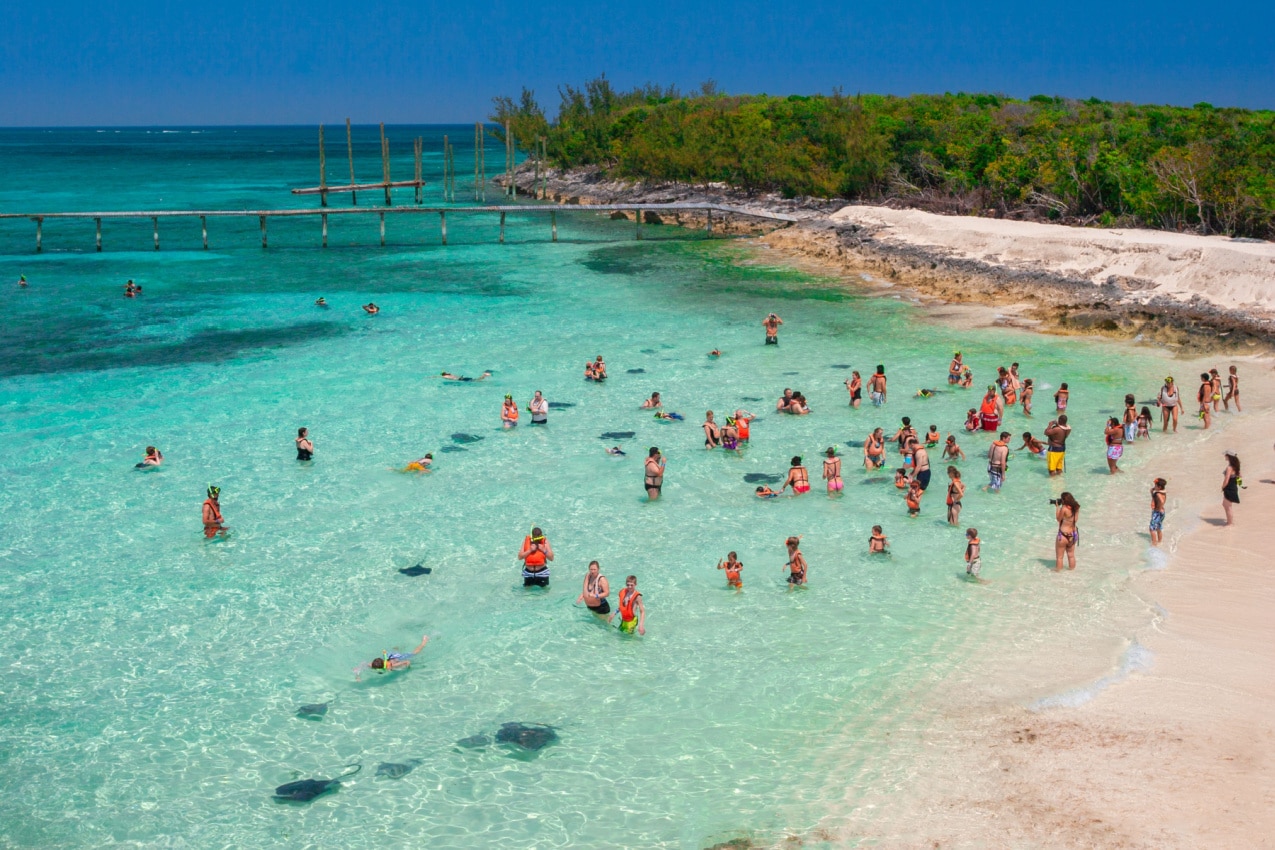
Nassau is an excellent destination both for solo travelers and family vacations. However, be mindful that, per the US State Department’s travel advisory, there is some crime in Nassau. So, while you soak in the beauty of this destination, keep your safety radar on and take the following safety precautions.
Essential tips for staying safe:
- Look up the nearest police station’s location on Google Maps
- Memorize the emergency number: 911 for the police, ambulance, and fire brigade
- Book at trustworthy hotels
- Do not answer your hotel door unless you’re certain who’s on the other side
- Explore the city during the day, and never in the late hours of the night
- Never, ever go in secluded neighborhoods and the Over The Hill area
- Withdraw money from a bank or ATM in a mall where there’s security around
- Don’t roam around the streets with expensive jewelry or other valuables
- Do not physically resist an armed thievery
- Have some Bahamian dollars (BSD) on hand for small purchases
Tips for traveling alone:
- If possible, stay within the hotel’s boundaries during the night. Nighttime outings may involve more risks, like conflict with intoxicated individuals or a police field operation
- Keep personal information private, especially from strangers you’ve just met
- Dress modestly, especially at night; if faced with catcallers, ignore them and avoid further interaction
- If you hit up a bar, drink responsibly and never leave your drink unattended to prevent potential spiking
- Politely decline if offered narcotics, as using them can lead to legal and safety threats
- Ensure someone back home knows your travel plans for added security
Tips for traveling with your family:
- Always keep a watchful eye on your kids
- Travel together to prevent any accidental separation
- Rent a car it spares you from constantly waiting for taxis and buses
- Avoid drinking and driving
- Carry a well-stocked medical kit
- Select reputable restaurants that prioritize food safety
- Stay at the hotel with your children in the evenings — dine Bahamian food or enjoy a movie night
Enjoy Traveling Safely!
So, if you’re planning a vacation to Nassau, get ready for abundant sunshine, warm temperatures, and the occasional rain shower, especially during peak hurricane season.
Speaking of safety, Nassau falls in the medium crime rate category. While it’s far from one of the world’s most dangerous places, it’s wise to exercise increased caution as you explore the city. Follow our safety tips, and let the Royal Bahamas Police handle the rest.
Have an amazing trip to Nassau!
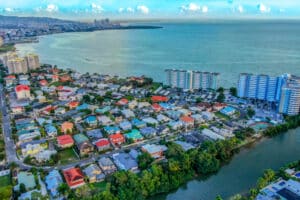
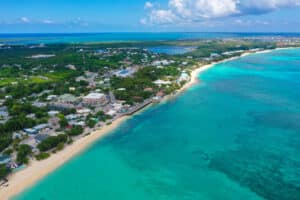
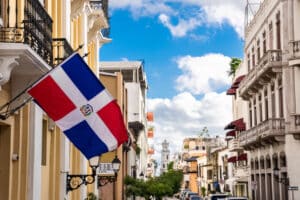
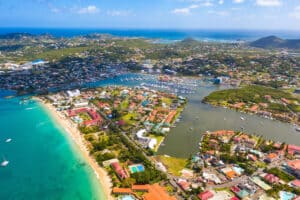
Very very good information about nassau that I got and I been reading a lot and yours is the best me and my wife is going in March we been there 12 years ago do you still have to take the boat to get to paradise island Atlantis were that big casino is thank You
Hi Rickey, it depends on where you’ll be. Here’s some information that should be helpful.
PS we took a cruise there 12 years ago and we are talking a cruise again MSC cruise line
Wow….. what a scare tactic this whole issue has become in a short time. False crime s reported by two ‘Karen’s’ and now we’re here.
Geeeezus was just there for two weeks. And a month before that….. I only robbed 4 people…. Hardly a crime spree😂😂😂😂😂
Hi Jeff, thanks for your lighthearted comments 🙂 Glad to hear you had a great trip there. If you want to share any tips, we’d like that. Also, if you have sources for your comments around some false crime claims, I’d love to see and reference that.